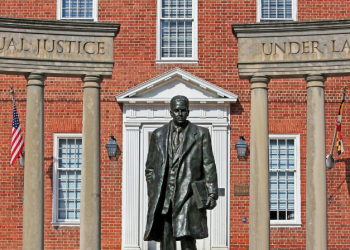Doug Wilson’s Co-Opting of Christian Nationalism
We are a little over a year into President Trump’s second term, and the Christian nationalism fever does not appear to be cooling off. Nevertheless, defining Christian nationalism remains a challenging task. Google AI gave me this: “Christian nationalism is an ideology that asserts the United States is a nation defined by Christianity, and its government should actively promote and maintain Christian values and principles in public life.”
That is broad and does little to distinguish “Christian nationalism” from other ostensibly Christian approaches to civics.
Here’s another definition, this time by Doug Wilson: “Christian Nationalism is the view that secularism is a hollow construct, now plainly revealed to be bankrupt. Additionally, CN is the belief that human societies require a transcendent anchor to hold everything together, and that this transcendent anchor should be the true and living God, and not a placeholder idol.”
Once again, this definition is fairly broad and of little help in distinguishing Christian nationalism from other Christian approaches to civics – e.g., theonomy.
The above definitions are fine in terms of broad, philosophical overviews, but they do not help people really understand what Christian nationalism is – namely, what it does, and what it results in. As with most ideas, one of the best ways to understand a concept is to contrast it with something else – in this case contrasting Christian nationalism with the Bible/God’s Law (theonomy).
For example, what would be the rubber-meets-the-road difference between Christian nationalism and God’s Law in terms of the Christian pastor who was recently deported, not because he committed evil, but because he didn’t get the correct paperwork? Generally speaking, the Christian nationalists will heartily agree with (and cheer on) a massive bureaucratic agency, funded via forced taxation, to regulate and transport people who have not committed evil according to God’s Law. Theonomists, on the other hand, want to follow God’s Law.
But let’s go back to Doug Wilson. The latest coverage of Wilson, this time provided by CNN, will serve to extend the reach of the Idaho pastor and the church network he represents – the Communion of Reformed Evangelical Churches. It will also play into Wilson’s obvious strategy of steering the discourse on Christian nationalism and attempting to take proverbial ownership of the term.
Given his very public and very clear desire to be considered a Christian nationalist, let’s hear him out a bit more. Here he answers the question, “Are there different varieties of Christian Nationalism?”
Yes, there are. But because the definitions are provided by a number of different observers, and because the situation is fluid and somewhat new, the boundaries between these varieties will sometimes be hard to identify with a high degree of precision. But with that qualifier, there are distinct varieties out there.
Wilson then identifies varieties of Christian nationalists, from political figures (Marjorie Taylor Greene, Michael Flynn) to populists (Andrew Torba, Andrew Isker) and even secular admirers of Christian culture (James Lindsay, Richard Dawkins). Yet he omits theonomists. (He does mention Rushdoony, but he does not mention theonomy.)
In many ways, I think Wilson is correct to not associate theonomists with Christian nationalists. I can only speak for myself, but I think most theonomists would agree with the broad definitions given by Google AI and Wilson, for example, but they would balk at the practical end of Christian nationalism: namely, rejecting God’s Law (theonomy) as the means to order society and instead embracing any number of man-made measures or ideas (read: the latest conservative plan to “win” or “fix” things in this nation).
I wrote an entire article outlining the divergence between theonomy and Christian nationalism, so I will not repeat all those points here. I will simply note that for some time now Wilson has been trending away from a theonomic approach to civics and towards a blander, Republican/conservative approach. Perhaps this is simply a strategy to get more followers during the Trump era, or perhaps it is the natural consequence of Wilson’s decades-long journey. In the 1990s, Wilson argued against criminalizing vices without biblical warrant, a stark contrast to his current tolerance for compulsory taxation and penalties for non-biblical offenses like possessing substances.
However, to be fair, Wilson has been saying for quite some time that his “general equity theonomy” is not that different from the civic views of those who oppose theonomy. (A telling admission?) Perhaps the perceived change I see over the past three decades of writings is just the natural outworking of his previously loose theonomic position being pressured by cultural trends and the opportunity to take advantage of MAGA and the rise of “Christian nationalism.” There is no doubt Wilson and his team know how to market an idea. Or perhaps he was writing in November more often back then.
In the same post quoted above, Wilson said the following: “[M]y general equity theonomy and the Reformed common law tradition have much in common, and differ largely in time and stage of development. The Reformed common law tradition is general equity theonomy after six centuries of maturation.” This is a helpful admission, and it highlights what I have been saying: Wilson is not arguing for the Bible as the standard of civics; he is not arguing for theonomy proper. If he were, the Reformed common law tradition, as he describes it, would differ from his theonomy not just in terms of “time” and “stage,” but in terms of substance.
Given all that, it is not surprising that Wilson is leaning away from the term theonomy and embracing Christian nationalism. This trajectory was also evident when Wilson was asked about Luke Saint’s 2022 book, The Sound Doctrine of Theocracy. My friend Henry wrote to Wilson, commending Wilson’s work and then asked him about Saint’s book and its discussion about God’s Law as it relates to criminal punishment. Wilson’s response? “Henry, I tend to think of works like this as sort of a poison pill that gets included with mainstream theonomy in order to scare people away from the central idea.”
Discussing God’s Law scares people away from the “central idea” of theonomy? But what is the central idea of theonomy if it is not God’s Law?
I value Wilson’s theological insight and cultural engagement; his works on postmillennialism and Christian apologetics have been very helpful to me. And I commend him for his stance during the CNN interview. I appreciate that he is challenging the idea that we can have a “neutral” public space. And his co-opting of the term “Christian nationalism” is not necessarily a bad thing. But I respectfully contend that his civic approach misses the mark. Wilson’s “theonomy” is much more comfortable with MAGA and Christian nationalism because those views are not arguing for the application of God’s Law. Robust discussions on God’s Law are only poison pills if our goal is to ride the popularity of a quasi-Christian movement. If our goal is faithfulness to God’s Law-Word, such discussions are just what are needed.












